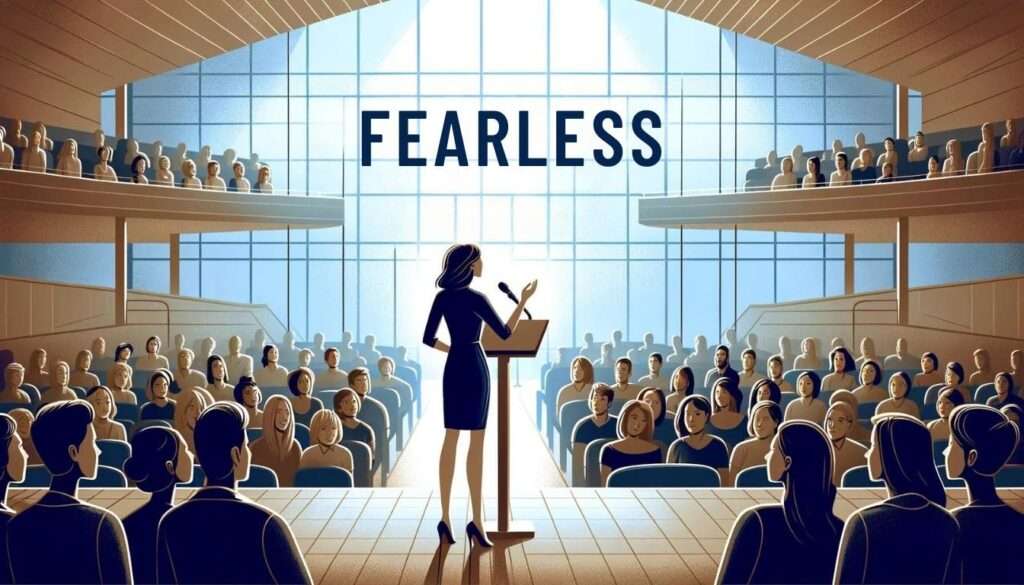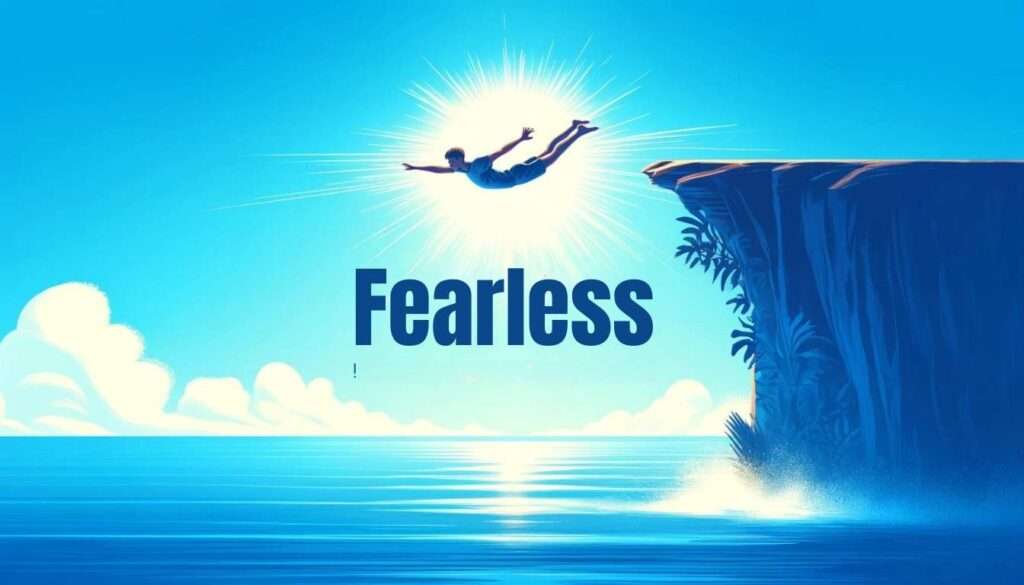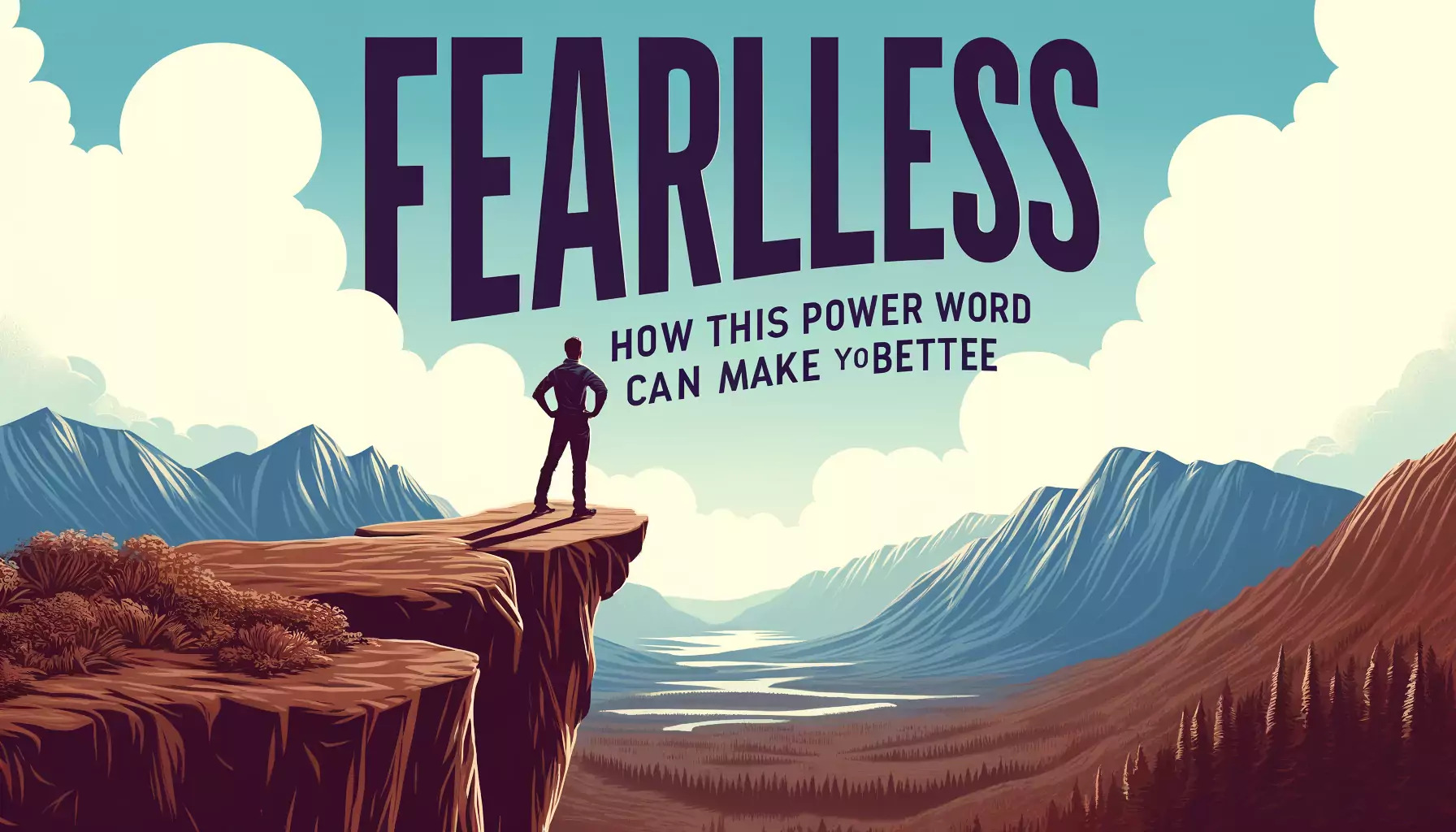Introduction
“Fearless: How this power word can make you better” captures the essence of fearlessness, a state of mind where you can conquer any obstacle and succeed in all aspects of life. The word “fearless” is a powerful adjective that can transform your mindset and your existence. Being fearless means having the courage to face your fears head-on, take calculated risks, and push yourself out of your comfort zone.
When you embrace fearlessness, you open the door to a world of endless possibilities. It’s not about the absence of fear, but rather about not letting fear control your actions. This mindset empowers you to embrace challenges, learn from your mistakes, and grow both personally and professionally. By adopting a fearless approach to life, you set the stage for achieving greatness and living a fulfilled and purposeful life.
Definition of Fearless
Fearlessness is not simply the absence of fear; rather, it is the ability to overcome it. It’s a state of mind where fear does not paralyze you but instead drives you to take action. Fearless individuals are those who do not let their fears control them, but rather embrace them and use them as fuel for growth.
The importance of being fearless
Being fearless is essential to achieving success in all aspects of life. It allows you to take risks, make bold decisions, and push past obstacles that would otherwise hold you back. Without fearlessness, you may find yourself stuck in a stagnant rut with little room for personal or professional growth.
Tony Robbins often speaks about the role of fearlessness in achieving personal success. “Your destiny shapes itself in your moments of decision,” he suggests. Being fearless doesn’t mean eliminating fear; it means learning how to control it.”

An overview of how fearlessness can improve your life
Embracing fearlessness can have a significant impact on your personal and professional development. It can boost your self-confidence, decision-making abilities, and resilience in the face of adversity, as well as lead to a career overview.
Furthermore, being fearless can improve relationships by helping you become more assertive and confident in social situations, while also allowing you to step out of your comfort zone and embrace new experiences.
Being fearless may seem daunting at first, but it’s important to remember that nothing great ever comes from playing it safe. Embrace your fears, use them as motivation for growth and success, and watch as the world opens up before you.
The Power of Fearlessness
Fear is an emotion that drives us to protect ourselves from danger. It is a primal response that has kept humans alive for thousands of years. While fear can be a useful tool in certain situations, it can also hold us back from achieving our full potential.
On the other hand, fearlessness is the ability to take action despite fear. It is a powerful mindset that can lead to great achievements and personal growth.
The Psychology Behind Fearlessness
Our perception of risk and reward explains the psychology behind fearlessness. Our brain automatically triggers the fight or flight response in situations involving risk.
This response prepares us to either confront the danger or avoid it altogether. However, through repeated exposure to risky situations, we can train our brains to view these situations as opportunities for growth and success rather than threats.
How to cultivate a fearless mindset
Cultivating a fearless mindset takes time and effort, but it is possible with discipline and practice. The first step is to identify your fears and understand how they are holding you back in life.
Once you have identified your fears, you can start taking small steps toward facing them head-on. This could be something as simple as speaking up in a meeting or trying a new hobby.
Using visualization techniques is another way to cultivate fearlessness. By imagining yourself succeeding in challenging situations, you are training your brain to view these situations as opportunities rather than threats.
Examples of fearless individuals who achieved greatness
History has shown us time and time again that fearlessness can lead to incredible achievements.
Rosa Parks refused to give up her seat on a bus during segregation, despite the potential consequences she faced.
Malala Yousafzai fought for girls’ education rights in Pakistan despite death threats, and
Elon Musk took massive risks to revolutionize the space industry.
These individuals all had one thing in common: they were fearless in the face of adversity. They saw challenges as opportunities for growth and refused to let fear hold them back. By taking risks and embracing their fears, they achieved greatness and left a lasting impact on the world.

Overcoming Fear: Identifying Your Fears
Before we can overcome our fears, we must first identify them. Many people go through life with a vague sense of unease or anxiety that they can’t quite put their finger on. They know something is holding them back, but they’re not sure what it is.
Identifying your fears requires taking an honest look at yourself and acknowledging the things that scare you. Some common fears include fear of failure, fear of rejection, fear of change, fear of the unknown, and fear of vulnerability.
It’s important to note that everyone has fears; even the most successful and confident people in the world have moments of doubt and insecurity. What sets them apart is their willingness to confront those fears head-on.
Strategies for overcoming fear
Once you’ve identified your fears, it’s time to come up with a plan for overcoming them. There are many strategies for dealing with fear, but some effective ones include exposure.
- Therapy involves gradually exposing yourself to the thing you’re afraid of.
- Cognitive-behavioral therapy involves altering your thoughts and behaviors related to the fear.
- Practice mindfulness meditation by learning to observe your thoughts without judgment. and
- Visualization involves imagining yourself successfully overcoming the fear.
It’s worth noting that there’s no one “right” way to overcome fear; everyone is different, and what works for one person may not work for another. The key is finding a strategy that resonates with you and sticking with it until you see results.
Benefits of Conquering Your Fears
Conquering your fears can have a myriad of benefits in both your personal and professional lives. For starters, it can help boost your self-confidence. You feel more capable and empowered when you overcome something that once held you back.
It can also lead to greater opportunities; when you’re not afraid, you’re free to pursue your goals without hesitation. Additionally, conquering your fears can have a ripple effect on other areas of your life. When you learn to face and overcome one fear, it gives you the confidence and tools to tackle others.
Overcoming fear can also improve your relationships. You can participate more fully in interactions with others when anxiety or insecurity aren’t constantly holding you back.
The Impact of Being Fearless on Personal Growth
Increased self-confidence: Believe you can do it.
Fear is a major barrier to self-confidence. When you operate from a place of fear, you limit your potential and diminish your sense of self-worth. However, when you embrace fearlessness, you believe in yourself and your abilities.
By taking calculated risks and facing your fears head-on, you prove to yourself that you are capable of achieving great things. When you cultivate a fearless mindset, you develop an unshakable belief in yourself.
This unwavering confidence allows you to tackle challenges with ease and approach new opportunities with enthusiasm. Additionally, more confident individuals tend to attract more positive experiences into their lives because they radiate positivity and optimism.
Improved Decision-Making Abilities: Trust Your Gut
Another benefit of being fearless is that it improves your decision-making abilities. Fear can cloud judgment and cause individuals to make irrational decisions or avoid making any decisions at all. When you remove fear from the equation, decision-making becomes more straightforward.
When operating from a place of fearlessness, individuals tend to trust their gut instincts more readily because they have confidence in themselves and their ability to make sound judgments. This results in better decisions that align with personal values and priorities.
Greater Resilience in the Face of Adversity: Bounce Back Stronger
Adversity is an inevitable part of life, but how one responds to it can make all the difference. Fearless individuals are better equipped to handle adversity because they have developed greater emotional fortitude.
Fearless people see challenges as opportunities for development and learning, rather than giving up or becoming discouraged.
They bounce back stronger than ever before because they possess the resilience necessary to overcome adversity. Fearlessness allows people to not only survive but also thrive in the face of adversity.

The Role of Fearlessness in Professional Success
Fearlessness is a key ingredient for success in the workplace. You cannot excel in your career if you constantly shy away from challenges or are too afraid to take risks.
Sheryl Sandberg, COO of Facebook, emphasizes the importance of fearlessness in pursuing one’s goals, especially for women in the workplace. She argues, “Fearlessness is not the absence of fear. It’s the mastery of fear. It’s about getting up one more time than we fall.”
Being fearless means having the courage to step outside of your comfort zone and push yourself further than you thought possible. It means being willing to try new things, take on new roles, and embrace change.
How Fearlessness Can Lead to Career Advancement
If you want to climb the corporate ladder, fearlessness is a must. Leaders, who are confident, decisive, and willing to take risks, often view those who are fearless in the workplace.
They are not afraid to speak up when they have an idea or challenge the status quo when it’s necessary. When you’re fearless at work, people notice.
Your colleagues will respect you more and trust that you can handle whatever challenges come your way. This can lead to increased responsibility, promotions, and ultimately a more fulfilling career.
Examples of successful individuals who embraced fearlessness in their careers
There are countless examples of successful individuals who embraced fearlessness in their careers. Take Steve Jobs, for example. He was known for being fearless when it came to making decisions about Apple’s products and business strategy.
Another great example is Oprah Winfrey; she started as a local news anchor but was not content with staying there for long. She took calculated risks throughout her career, which eventually led her to become one of the most successful media moguls of all time.
The importance of taking calculated risks
Being fearless does not mean being reckless. It’s important to take calculated risks if you want them to pay off in the long run. This means weighing the potential benefits against the potential drawbacks before making a decision.
If you’re considering taking on a new role or starting a new project, don’t jump in blindly. Do your research, gather information, and consider the potential outcomes before deciding.
This will help you make more informed decisions that are based on logic rather than fear. Fearlessness is a crucial component of professional success.
It’s important to be able to step outside of your comfort zone and take calculated risks if you want to advance in your career. Look to successful individuals who have embraced fearlessness as inspiration, and remember that being fearless does not mean being reckless—always weigh the potential benefits against the potential drawbacks before making a decision.
Fearless in Relationships and Social Situations
Regarding relationships and social situations, fear can hold us back from truly connecting with others. Fear of rejection, fear of judgment, fear of vulnerability—all of these things can prevent us from forming deep and meaningful relationships. That’s why cultivating a fearless mindset is so important when it comes to our social lives.
Fearlessness in personal relationships is about the courage to be authentic and openly communicate, creating genuine intimacy. Dr. Brené Brown highlights that ‘staying vulnerable is a risk we have to take if we want to experience connection.’ This underscores that being fearless involves sharing our true selves and embracing vulnerability despite the potential for hurt. Such bravery not only strengthens bonds but also fosters resilient, meaningful connections.
How Fearlessness Can Improve Relationships and Social Interactions
When we approach social situations with a fearless mindset, we’re able to let go of our inhibitions and connect with others on a deeper level. Fearlessness allows us to be vulnerable, which in turn makes others feel comfortable being vulnerable around us. This creates an environment where real connections can form.
In addition, fearlessness gives us the confidence to speak our minds and be assertive when necessary. We’re able to set boundaries and communicate effectively with others, which leads to healthier relationships overall.
Tips for Being More Assertive and Confident in Social Situations
If you struggle with being assertive or confident in social situations, there are some things you can do to overcome this:
- Practice mindfulness: take some time before social situations to center yourself and focus on your intentions for the interaction.
- Breathe deeply. If you start feeling anxious or nervous during a conversation, take a few deep breaths to calm yourself down.
- Speak up: don’t be afraid to share your opinions or ideas; they’re just as valid as anyone else’s.
- Avoid apologizing unnecessarily. Women especially tend to apologize for more than necessary; try not to apologize for things that aren’t your fault or that you’re not sorry for.
How to Overcome the Fear of Rejection
“The fear of rejection is one of the biggest obstacles to forming healthy relationships. Putting yourself out there and risking rejection can be daunting. But if you want to truly connect with others, you need to learn how to overcome this fear.
One way to do this is to reframe rejection as a learning opportunity. When someone rejects you, it’s not a reflection of your worth as a person; it simply means that the two of you weren’t a good match.
As Albert Einstein once said, ‘Failure is success in progress.’
Take some time to reflect on what went wrong and what you can learn from the experience. In addition, try not to take rejection personally.
Everyone has different preferences and tastes, and just because someone isn’t interested in you doesn’t mean there’s anything wrong with you. Overall, cultivating fearlessness in our social lives allows us to form deeper connections with others and live more fulfilling lives.”

The Benefits of Stepping Out of Your Comfort Zone
Fearlessness is not just about conquering your phobias or overcoming your doubts. It’s also about embracing adventure and new experiences with an open heart and mind.
When you step out of your comfort zone, you challenge yourself in ways that build resilience, self-confidence, creativity, and personal growth. The benefits of stepping out of your comfort zone are numerous.
When you try something new or push yourself beyond your perceived limits, you expand your horizons and discover hidden talents or passions. You learn to adapt to change, cope with uncertainty, and overcome obstacles with grit and determination.
You gain a sense of accomplishment that boosts your self-esteem and motivates you to keep pushing forward. Moreover, research shows that people who engage in novelty-seeking behaviors are happier, healthier, and more successful than those who stick to a familiar routine.
“Stepping out of one’s comfort zone is a testament to fearlessness. It’s in the act of embracing the unknown and confronting discomfort that true growth occurs.
“As the saying goes, ‘Growth and comfort do not coexist,’ illustrating that fearlessness isn’t about the absence of fear, but about the pursuit of growth despite it.” – Anonymous
How to Embrace Fearless Living
Embracing fearless living requires a shift in mindset from fear-based thinking to growth-based thinking. Start by identifying the areas where fear is holding you back: Is it public speaking?
Traveling solo? Asking for a promotion?
Then ask yourself, “What’s the worst that can happen if I try?” Often, our fears are based on irrational beliefs or worst-case scenarios that don’t reflect reality. Once you have challenged these assumptions, set small goals for yourself that move you gradually but consistently outside your comfort zone.
For example:
- Take a different route to work.
- Try a new hobby.
- Meet someone new.
- At a meeting, speak up.
As you take these small steps towards fearless living, remind yourself why it matters: You’re not just overcoming fear; you’re opening the door to new opportunities for learning, growth, connection, and joy.
Conclusion
Fearless living is not just about being fearless, but rather about embracing the unknown, taking chances, and facing fears. Stepping out of your comfort zone can be scary, but the rewards are worth it. Whether you’re starting a new career or traveling to a foreign country, each adventure will help you grow in ways you never thought possible, helping you become more competent and self-assured.
Fearlessness is not the absence of fear; rather, it is the courage to face fear head-on and keep moving forward despite our doubts and insecurities. So, dare to take that risk; I assure you, you’ll be glad you did!
FAQs
What does it mean to be fearless?
Being fearless means having the courage to face your fears head-on, taking calculated risks, and stepping out of your comfort zone. It doesn’t mean the absence of fear, but rather using it as motivation for growth and success.
How can I cultivate a fearless mindset?
Cultivating a fearless mindset involves identifying your fears, taking small steps to confront them, and practicing visualization techniques to imagine success in challenging situations. Consistent exposure to feared situations helps build resilience.
Why is being fearless important for personal growth?
Fearlessness is essential for personal growth because it allows you to take risks, make bold decisions, and overcome obstacles that might otherwise hold you back. It fosters self-confidence, decision-making abilities, and resilience.
How can fearlessness improve relationships?
Fearlessness improves relationships by helping you become more assertive and confident in social situations, enabling you to express yourself authentically and set healthy boundaries.
What are some benefits of overcoming fear?
Overcoming fear boosts self-confidence, opens up new opportunities, improves relationships, and enhances resilience. It also creates a ripple effect, giving you the tools to tackle other fears in your life.
Can being fearless help with career advancement?
Yes, being fearless can lead to career advancement by making you more willing to take on new roles, embrace challenges, and innovate. Fearless individuals are often seen as leaders and decision-makers.
How can I overcome the fear of rejection in social situations?
To overcome the fear of rejection, try reframing rejection as a learning opportunity and not taking it personally. Practice self-acceptance and remember that everyone’s preferences vary.
What role does failure play in developing fearlessness?
Failure plays a crucial role in developing fearlessness by providing learning opportunities and helping build resilience. Embracing failure as a stepping stone to success fosters growth and development.
Can fearlessness be learned?
Yes, fearlessness can be learned through practice, exposure, and changing your mindset. Developing a growth mindset and seeking out challenges help cultivate fearlessness over time.
How does being fearless contribute to success in life?
Being fearless contributes to success by encouraging you to pursue opportunities, overcome obstacles, and take the risks necessary for growth. It fosters confidence, resilience, and a proactive approach to challenges.










